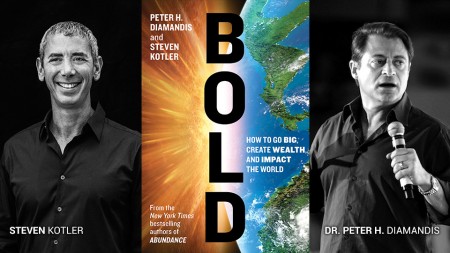April 17, 2015 – The title of this posting is the same as the title of Peter Diamandis and Steven Kotler’s sequel to “Abundance,” a book I reviewed some time ago. In the first book the authors focused on the impact of rapid innovation on a finite world providing abundant evidence of a brighter future. “Abundance” was simply a statement of evidence on where we we were going. “Bold” provides the mechanisms to get there.
The book is all about how change today is exponential rather than linear. Instead of 1 + 1 = 2 and 2 + 1 = 3, “Bold” sees the progress of humanity being driven by growth derived from disruptive innovation. This type of change is derived from what the authors call “The Six Ds,” Digitalization, Deception, Disruption, Demonetization, Dematerialization and Democratization.
Let me explain what each of these terms is all about.
Digitalization – today we live in the age of bits and bytes. Images, words, music, communication, all have gone digital. This is a monumental technology paradigm shift with disruptive implications for our traditional way of doing things.
Deception – because we can digitize stuff through experimentation we can find new ways to produce the things we value in our technical world. Film turns into pixels of light. We start with a 1 megapixel camera and in short order are creating 24 Megapixel images. Moore’s Law, the doubling of the number of transistors put on a single chip every 18 months, is the perfect measure of deceptive change. The central processor in your laptop today has more horsepower than the largest mainframe computer systems built 30 years ago.
Disruption – when you digitize a technology you disrupt it. Where is Kodak today? Consider what the iPod has done to recording media. What music downloads have done to the recording industry. What NetFlix has done to film on DVD and Blockbuster stores. The examples are numerous.
Demonetization – look at how iPods, digitalization and the Internet forever changed the relationship of musicians to the record labels, and musicians to their listeners. Or how Linux, Firefox, Google and other software developers have made applications like the one I am using right now to both write and post this blog. This is something I can deliver for free because other than by sweat and writing effort it costs me nothing. And yet a Google, in giving away applications, has created an entirely new business model and turned into a multi-billion dollar enterprise that is changing our planet forever.
Dematerialization – the form factor of choice today is the smartphone. Its apps have replaced numerous devices including the calculator, the camera (still and motion), the game console, GPS, your watch (although smart watches are trying to push back against the trend), and even that coveted iPod or mp3 player. Devices that in total could end up costing thousands of dollars are now packed into a single form factor that often can be had for zero dollars with a mobile phone and data plan.
Democratization – knowledge has become ubiquitous. What once came with a cost, think Encyclopedia Britannica, is now free. Think Wikipedia. This last “D” is the ultimate exponential change where a Masai herdsman with mobile phone can just as easily learn about the latest innovations in agribusiness as a farmer riding her tractor in Minnesota.
Diamandis and Kotler, having set the table on disruptive change, share stories about technologies that are driving disruption including 3-D printing, sensors and the Internet of Things, infinite computing (driven by Moore’s Law), artificial intelligence, robotics, and genomics and synthetic biology. They describe the billionaire wisdom of people like Richard Branson, Elon Musk, Larry Page, and Jeff Bezos, all leading disrupters driven by a vision of the future of their own making.
All of this is very much in keeping with the feel of the first book, “Abundance.” The second half, however, is a cookbook, a series of recipes for crowdsourcing and crowdfunding. The authors describe these two exploding phenomena and provide a step-by-step guide on how to take your disruptive idea and fund it through the crowd on sites like Kickstarter, Indiegogo and Rockethub. Diamandis has not only been instrumental in getting crowdfunding off its feet through Indiegogo, he has also used it to fund one of his companies, Planetary Resources. So if your entrepreneurial bent is pushing you to undertake a new venture, then you will find reading from “Chapter Seven, Crowdsourcing: Marketplace of the Rising Billion, to “Chapter Ten, Incentive Competitions: Getting the Best and Brightest to Help Solve Your Challenges,” well worth the time invested.
When I started reading “Bold” I was connecting to the future. By the time I finished it I felt I was reading a marketing course for the Internet Age. I liked the vision of the beginning. I was less enamored by the “how to” feel at the end. And yet I recommend you read “Bold,” but before it get a copy of “Abundance.” Together the two make a compelling case for a better future for humanity and the planet.




















